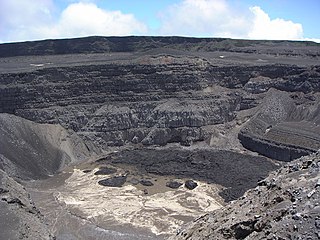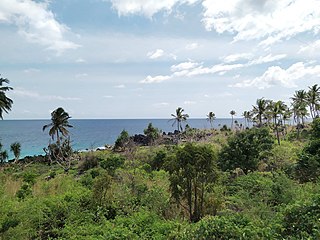Related Research Articles

The Mascarene Islands or Mascarenes or Mascarenhas Archipelago is a group of islands in the Indian Ocean east of Madagascar consisting of the islands belonging to the Republic of Mauritius as well as the French department of Réunion. Their name derives from the Portuguese navigator Pedro Mascarenhas, who first visited them in April 1512. The islands share a common geologic origin in the volcanism of the Réunion hotspot beneath the Mascarene Plateau and form a distinct ecoregion with a unique flora and fauna.

Mount Karthala or Karthola is an active volcano and the highest point of the Comoros at 2,361 m (7,746 ft) above sea level. It is the southernmost and larger of the two shield volcanoes forming Grande Comore island, the largest island in the nation of Comoros. The Karthala volcano is very active, having erupted more than 20 times since the 19th century. Frequent eruptions have shaped the volcano's 3 km by 4 km summit caldera, but the island has largely escaped broad destruction. Eruptions on April 17, 2005 and May 29, 2006 ended a period of quiet.

The Malagasy paradise flycatcher is a species of bird in the family Monarchidae. It is found in Comoros, Madagascar, and Mayotte. Its natural habitats are subtropical or tropical dry forest and subtropical or tropical moist lowland forest.

The Wildlife of Seychelles comprises the flora and fauna of the Seychelles islands off the eastern coast of Africa in the western Indian Ocean.

The Comoros forests is a terrestrial ecoregion which covers the Comoro Islands, which lie in the Mozambique Channel between Madagascar and East Africa. These include four main islands: Grande Comore, Anjouan and Mohéli, of the Union of the Comoros, and Mayotte, a department and region of France.
References
- ↑ "Madagascar and Indian Ocean Islands - Species | CEPF". www.cepf.net. Retrieved 2021-07-24.
- Sinclair, Ian and Olivier Langrand (2003) Birds of the Indian Ocean Islands